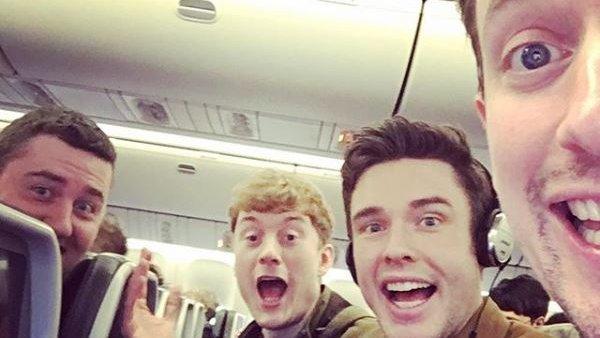Dara Ó Briain on why comedians are reluctant to do Mock The Week
- Published
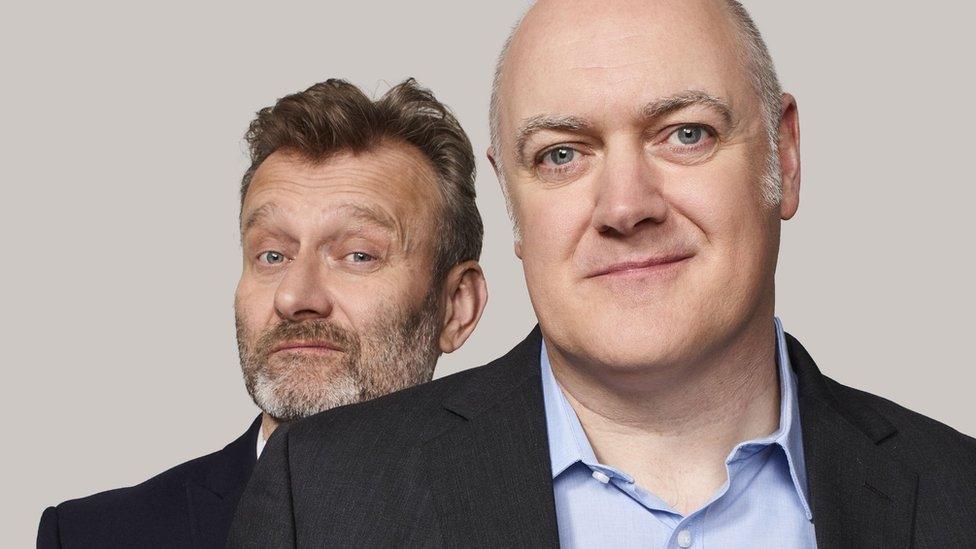
Hugh Dennis and Dara Ó Briain have appeared in every episode of the show since its 2005 launch
Mock The Week has been a TV comedy staple for well over a decade. But, its host explains, comedians aren't always enthusiastic to appear.
BBC Two comedy panel series Mock The Week quickly became a rite of passage for rising comedians after it launched in 2005.
Frankie Boyle, Russell Howard and Andy Parsons are among those who experienced significant career boosts after appearing as regular panellists.
These days, host Dara Ó Briain and panellist Hugh Dennis are the only two of the original line-up who remain on the show, and both have appeared in every episode.
But, Ó Briain tells BBC News: "The world is full of comedians who are reluctant to do Mock The Week.
"Firstly, the show is quite intense anyway, even though it's not what it was when it was Frankie and Russell - that really was competitive.
"Now it's far looser, more fluid conversation than it was. It used to be boom, boom, cut across each other, elbows, and it's just thankfully relaxed a lot now.
"So now we are a lot more listening to each other and riffing off each other than we ever were."
Jo Brand and Rory Bremner are among those who have said they wouldn't want to return to the show.
Bremner left after two years as a panellist, telling The Telegraph, external he felt there was a "highly competitive and quite aggressive tendency there", while Brand wrote in The Guardian, external: "We just don't like the prospect of having to bite someone's foot off before they let us say something."
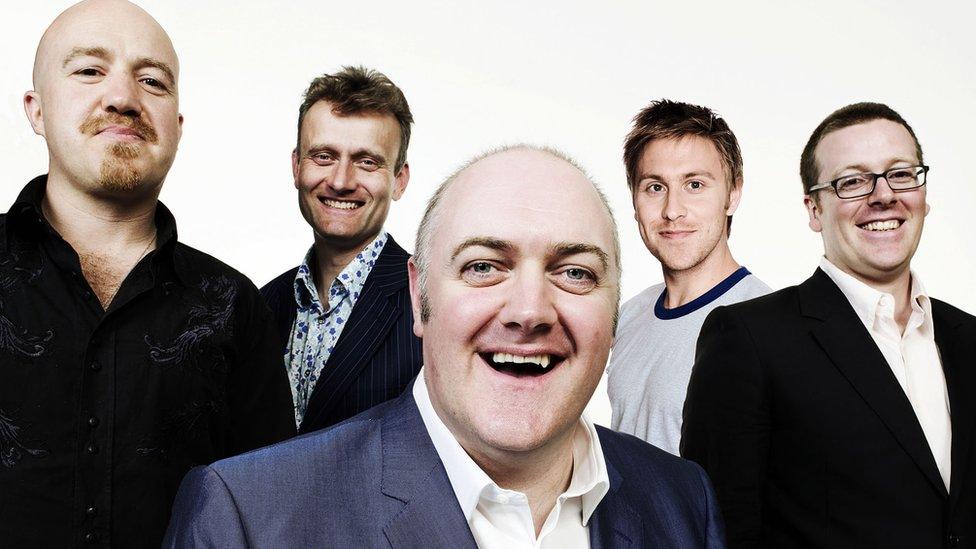
L-R: Andy Parsons, Hugh Dennis, Dara Ó Briain, Russell Howard, Frankie Boyle
But in recent years, Ó Briain says, the basic identity of Mock The Week has changed, and it has become "a much less one-linery type show".
"Obviously, Frankie [Boyle] was a one-liner comedian, so he was coming in with staccato bursts of brilliant but brutal stuff that meant it wasn't conversational... Frankie is the end piece of a jigsaw.
"Nothing else could attach because Frankie would close the topic off with a brilliant one-liner. So it meant it was very staccato as a show.
"Whereas I'm much more waffly, I want to mess around, and also, the show went younger because younger comics came through. Also, you're expected to do the stand-up round, and do the walking out round, it's not an easy show to do."
Boyle's tendency to seize the limelight was perhaps most noticeable in the Scenes We'd Like To See and If This Is The Answer What Is The Question rounds - which allow the comedians to jump in with multiple answers.
Boyle would often get to the microphone first or come up with particularly offensive suggestions, which would be difficult to follow-up on because of the huge reaction from the audience.
But a look at the more recent episodes sees a more genial feel take over, where the microphone time is more evenly spread and comedians bounce off each other more.
Ó Briain says: "People are very happy to do Mock a few times, and then go, 'right, I've done my Mock.' So we now have settled into a position where it's me and Hugh [Dennis], moving generations of comics through."
The 46-year-old continues to tour intensively as a stand-up comedian in addition to filming the show. Indeed, when we speak, he is 85 dates into a tour which will go on for another year-and-a-half.
But as his profile has risen, he's shied away from one annual comedy staple in particular - the Edinburgh Fringe Festival.
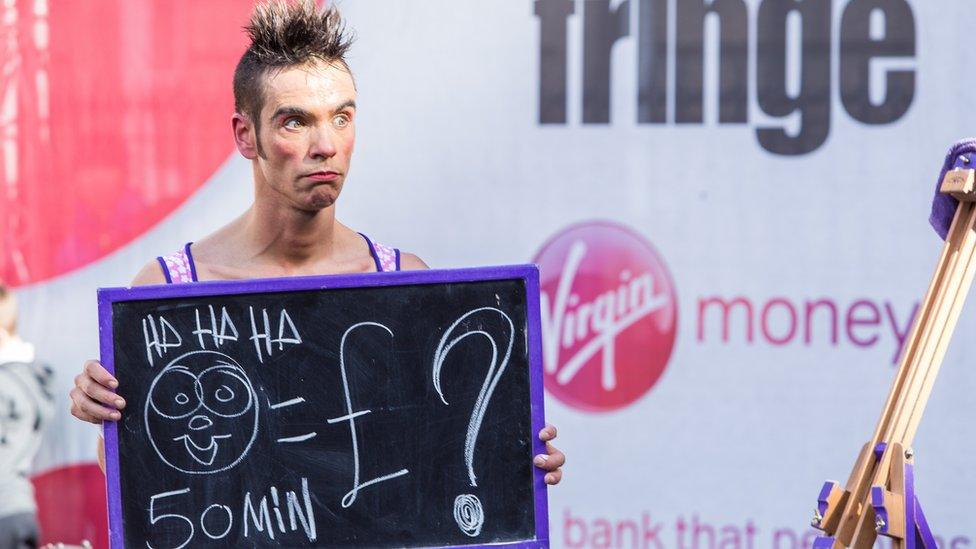
Competition for ticket sales is fierce at the Fringe, with many acts performing for free
"I don't think TV people should be doing Edinburgh," he says.
"If you go up there and you're already well known, which is to say that you could play Edinburgh without it being the festival... I think it's wrong for me to do it during the festival, because I think that takes ticket sales away from [less well-known comedians].
"There's a limited number of ticket buyers in that city at that time. They already know me. They need to find the next Dara Ó Briain."
While there's no shortage of aspiring stand-ups, one thing which is regularly commented on in the industry is how the overwhelming majority of comedians are left-wing.
Lee Hurst and Geoff Norcott are among the few notable exceptions in a landscape where most comedians poke fun at Brexit or the Conservative government.
"It's a weird one," Ó Briain says. "Right-wing comedy tends not to work so well just because there's an element of what's punching up and what's punching down... it's easier to make jokes when you're attacking something that's in power rather than attacking down.
"Any time somebody [on the right] complains about this, the answer is, go and write some jokes. For a start, you're the one who believes in a free market, there's a market there, so go and write some.
"People go, 'Oh you don't make jokes about the Muslims,' - go for it. Listen, no-one is stopping you from doing all the Muslim jokes you want. You just can't order me to do the jokes on the topics you want."
Ó Briain may be best known as a comedian and TV host, but in recent years he's been branching out into writing, science.... and writing about science.
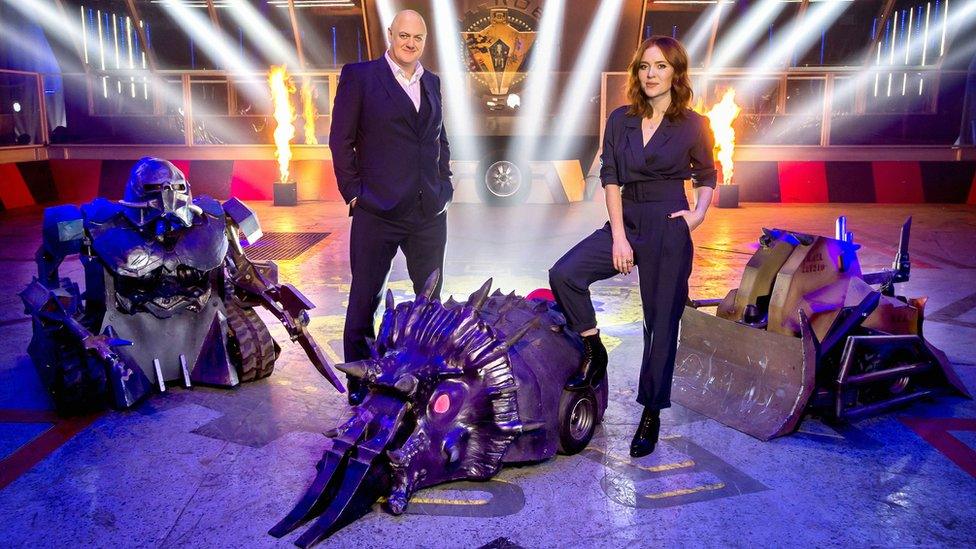
Dara Ó Briain presented the rebooted Robot Wars alongside Angela Scanlon
Not only does he host programmes like Stargazing Live, but he authored 2017's Beyond The Sky - a science book for children.
He's now gearing up for the release of its follow-up - Secret Science: The Amazing World Beyond Your Eyes.
"The last book was a journey that went out into space, a book about the big - the big stuff like space, science and gravity," he explains.
"For this one we moved the scope all the way back down into ordinary life.
"We show the invisible forces that you're contending with all the time, whether it's the electrons that are heating toasters, the way the body uses food, the chemicals in your brain which are keeping you excited, asleep or hungry."
But when asked to single out the most interesting fact he learned while researching, he settles on one from the animal kingdom.
"Giraffes sleep for five minutes. In chunks. Never for a prolonged period of time," he says.
"For a long time we didn't think giraffes slept at all, because nobody had ever seen them sleep. But they put their heads up in the leaves and they sleep.
"By contrast, lions sleep for 18-20 hours a day. The difference is lions eat giraffes and giraffes don't eat lions. So giraffes have to keep an eye open at all times."
Secret Science: The Amazing World Beyond Your Eyes is published on 6 October.
- Published2 July 2018
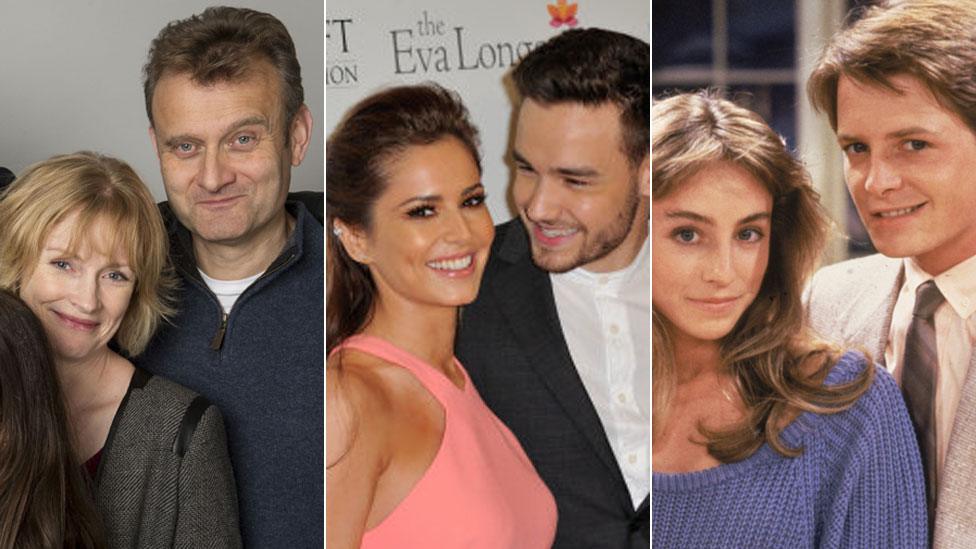
- Published6 January 2018
